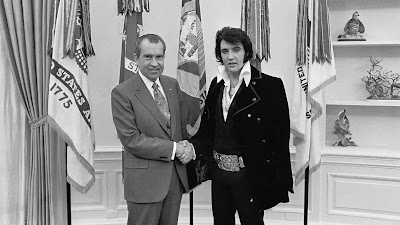A 1963 Rolls Royce Phantom serves as a rolling interview space for Eugene Jarceki's The King. The documentary hits all of the main ports of call in Elvis Presley's life from his early days in Tupelo, Mississippi through to his final ones at Graceland. As the scene shifts to a new chapter the Rolls maneuvers along the local streets with different people jumping in back to give their relocation of the King. During most of the picture director, Jarceki is behind the wheel of the vehicle. As parallel narratives detail the rise of Presley in lockstep with America's post war boom followed by his stagnation and decline mirroring that of the country. A third undercurrent is the lead up to the 2016 U.S. Presidential election , Donald Trump gaining momentum with Alex Baldwin delivering the most ironic statement from the back of the Rolls that he does not know when the film will air but he can guarantee that Trump will not be president as he take a poll of who is more popular, Trump, Hillary or Bernie Sanders.
The crew rolls into Elvis' hometown looking for his birthplace and the home he grew up in. Elvis parents were poor, his dad went to prison for passing bad check, leading the family to move into free housing for whites in a mainly black area of town. Here Elvis and his childhood friend George Klein would try to get into the black clubs to hear the blues with Elvis attending a black church on Sundays to absorb as much of the sounds as he could. In this settings as others images flash across the screen with the events of the time. FDR and the new deal, poverty, sharecropping, and lynching open in plain view. He was working as an electrician when he wondered into Sun records began to sing real blues songs during a break then label owner Sam Philipps knew he had the right face with the emotional depth to bring Big Mama Thorton's That's Alright and Hound Dog to a mainstream audience. Which is what occurred in meteoric fashion starting July 20, 1954.
Elvis' rise and the plight of the original authors of the music that launched his success is often revisited in the piece. Presley's army experience is contrasted with that of Muhammad Ali's. Recounters including CNN's Van Jones and an excellent Chuck D wondered what would have been if he walked alongside Dr. Martin Luther King and other actors at Civil rights rallies. Instead, Elvis kept his opinion on controversial subjects to himself. Heading instead to Hollywood upon his return from the army to make bad movies for 10 years then to Las Vegas putting his decline into high gear. Instead of the better option going out on tour after the scorching heat caused by his 1968 comeback special.
The King is a historical journey spanning the years of Elvis' life, personal events intermingle with the pulse of the country. Questions are raised as Presley's choices are examined. The constant is the Rolls Royce steering into towns, past significant landmarks and cruising along route 66 marking the King's move out West. Elvis' decline is put in step with similar events in the country seemingly setting the seeds for the rise of Trump that edited into the proceedings not so subtly in the background. Jarceki's film covers a lot of ground offering a different slant especially considering the commitment to a moving soundstage.
*** Out of 4.
The King | Eugene Jarceki | Germany / U.S.A.| 2018 | 117 minutes.
Tags: Tupelo, Elvis Presley, Colonel Tom Parker, Sun Records, RCA, Documentary, Rolls Royce Phantom V, Blues, Rock & Roll, Big Mama Thorton, Tupelo, Memphis, Nashville , Hollywood, Las Vegas.

No comments:
Post a Comment